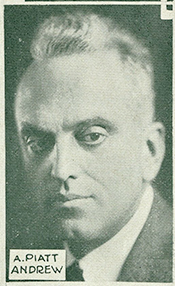
Born February 12, 1873.
A native of La Porte, Indiana, Andrew had a relatively nondescript childhood that in no way prefigured his busy and influential life. A gifted student, he went on to Princeton, graduating in 1893, then became a member of the Harvard Graduate School of Arts and Sciences, receiving a graduate degree in 1895, then a doctorate in 1900. Having relocated to Massachusetts to study at Harvard, Andrew laid down roots, taking residence in Gloucester and becoming an instructor and assistant professor of economics at Harvard. A bachelor, he built himself an impressive mansion overlooking the harbor with extensive grounds, which home he named “Red Roof” and served as a place of comfort, peace, and companionship for him, particularly with his neighbor, Henry Davis Sleeper, also a bachelor, and a widely respected interior designer.
His political career began in 1907, when Andrew published a paper, in January, predicting the economic collapse that later followed in late autumn of the same year. The country, looking to recover, realized some changes were necessary, and picked Andrew to be among the economists invited to decide what those changes would be, making up a body officially called the National Monetary Commission. This body, led by Senator Nelson Aldrich, traveled over Europe to study their banking conditions and to see how the United States compared in practice, which, they quickly realized, compared badly. As part of this work, Andrew took a leave from Harvard and traveled to the Universities of Halle, Berlin, and Paris, studying the central banks of Britain, Germany, and France. He also took on additional duties as Director of the Mint, appointed by the President, in 1909 and 1910, then Assistant Secretary of the Treasury from 1910 through 1912. With other members of the Commission, he attended and contributed greatly to the historic meeting at Jekyll Island, the report from which recommended and served as a key instrument in the creation of the Federal Banking Reserve, the primary tool by which the federal government can influence and monitor the economy.
His career, risen so fast, collapsed precipitously in 1912 as the Republicans lost the White House to Wilson, resulting in Andrew losing his job. Casting about for something to do, and with war on the horizon, Andrew arrived in France in 1914, determined to aid in the war effort. At first, he drove ambulances, but his organizational skills, energy and intelligence were quickly realized, to the effect that an entirely new position was created for him, that of Inspector General of the American Ambulance Field Service. Touring the ambulance sections in his new capacity, he found a corps largely dispirited and bored, kept by French law from the front lines, and, they felt, true effectiveness. Determined to be as effective as possible in the war effort, Andrew met with top French military officials, convincing them to allow a small section of ambulances to go to the front on a trial basis. The success was immediate and overwhelming, with the French creating the American Ambulance Field Service, with Andrew as head, under the command of the French Army. Back home, Sleeper organized domestically, recruiting new drivers and raising funds. Eventually, as America entered the war, it came under their leadership.
Andrew returned from the war an effective veteran and reinvigorated with a sense of patriotic duty. As a stalwart in the local Republican party, when his representative resigned, Andrew ran for and was elected to fill the vacancy in 1921. He has remained since, a key part of the Republican party, especially in terms of economics, as well as a supporter of veterans causes.